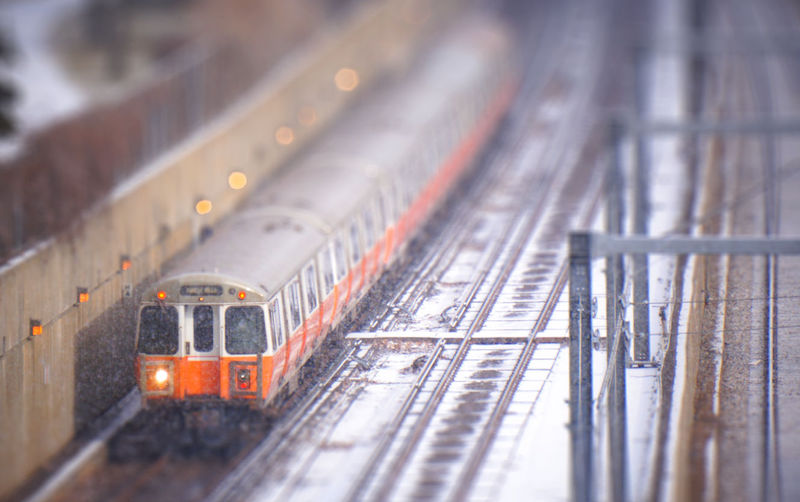
The MBTA must be safe, reliable, and affordable for everyone who wants to ride it. Photo: Mike Steinhoff via Creative Commons 2.0
This post was updated on July 30, 2021
After tireless advocacy from CLF and our partners, Massachusetts Governor Charlie Baker has signed the state’s fiscal year 2021 supplemental budget which creates a new MBTA governing board.
The new board will have seven members. One of those members must represent an environmental justice population, which is a key provision CLF pushed for. The group will also be required to consider environmental, public health, and workforce development issues at the MBTA, which was not an obligation for the previous board.
Finally, the language ensures that the board will be permanent, which will do away with the yearly debate among legislators around extending the life of the board. It will be made up of people who will focus solely on the pressing issues facing MBTA riders, and given broad oversight over the transit needs in communities across eastern Massachusetts.
The winter of 2015 is notorious among New Englanders. Boston recorded its snowiest winter ever, racking up 108.6 inches of snowfall by mid-March – most of which had fallen only since late January. A polar vortex came along with this “Snowmaggedon,” with temperatures across New England plummeting to record lows for much of February 2015.
For those of us living in the Boston area, the weather extremes plunged the MBTA into a full-blown crisis. Day after day, increasingly frustrated transit riders were subjected to long delays, often waiting outside in snaked queues around train stations and bus stops in bitter temperatures. It would be weeks before we saw the MBTA return to any level of typical, reliable service (which was never all that reliable in the first place).
The outcry over these failures was swift, prompting Governor Baker to appoint a temporary governance board tasked with ensuring that riders would not be, literally, left out in the cold again. The legislature extended the tenure of the temporary board twice in recent years and required it to address budget concerns and safety.
In the six years since its inception, that governance board – called the Fiscal and Management Control Board – has made major progress in improving operations. It oversaw investments in MBTA infrastructure, offered unprecedented transparency into MBTA operations and capital needs, and provided a dedicated venue for the public to speak up about issues and concerns.
The five-member Control Board was scheduled to be phased out last June – that is, until COVID-19 thrust the MBTA and its riders into crisis once again. With the Control Board now slated to expire this June, the Massachusetts legislature is considering the MBTA’s future governance structure.
CLF and our partners from the Zero-Emission Vehicles Coalition, the MBTA Advisory Board, and Transportation for Massachusetts have advocated for improved public transit for decades. We recently looked at what the next version of MBTA governance should look like – and how to ensure our public transit system is safe, reliable, and affordable for all of its riders.
Climate Change, COVID-19, and a 21st-Century Transit System
We are on the cusp of transformation when it comes to the ways we transport people and goods. The climate crisis is forcing us to rethink our diesel- and gas-fueled vehicles to cut climate-damaging emissions – 40% of which come from transportation in New England. At the same time, the other harms created by our transportations systems, including air and noise pollution, fall much harder on communities of color, limited English proficient households, and low-income communities than others.
In cutting those emissions and addressing those harms, we have a unique opportunity to reimagine our region’s transportation systems as ones that are both affordable and accessible to everyone.
A key piece of that transformation must be public transit. As the region’s largest city, Boston also has the largest regional public transit system, serving 1.3 million daily riders during the week (pre-COVID-19). As we start to emerge from the pandemic and consider how the MBTA must be managed for the 21st century, we need a governance board that will ensure a safe, reliable, affordable, and accessible transit system for all. That system also must:
- motivate people to shift out of their single-occupancy cars and trucks and onto transit; • promote transportation justice by better serving all riders; and
- cut climate-damaging emissions and air pollution that harms public health.
Diversity, Flexibility, and Independence Are Key to an Improved MBTA
How the MBTA is governed affects every one of its riders. That’s why we need to expand the Control Board’s scope of work to better balance short- and long-term rider needs. The next Control Board must ensure improved and safer service now and plan for the service we will need over the next few decades. It should also be tasked with:
- Building rider confidence that riding the T is safe during and after the pandemic;
- ensuring rider and MBTA employee safety;
- determining capital and operating revenues needed to manage a 21st-century transportation system;
- cutting climate-damaging emissions associated with MBTA operations;
- expanding access, affordability, and reliability for riders dependent upon public transit;
- assessing infrastructure that is vulnerable to climate change and implementing resiliency improvements; and
- overseeing and expediting the completion of capital projects resulting in a more reliable transit system for all riders.
In addition, the next Control Board should have:
Sole oversight of the MBTA general manager: By making the Control Board solely responsible for hiring and firing the MBTA general manager, the position will be directly accountable to riders.
Independence from state agencies: The next Control Board should be independent of the Massachusetts Department of Transportation (MassDOT) Board of Directors and solely responsible for the issuance of MBTA debt, budgeting, and capital spending oversight. It also should be responsible for overseeing daily MBTA operations.
A larger, more diverse membership: The Control Board should expand to seven members to ensure a diverse set of experiences and perspectives. It must also be composed of routine riders of the bus, train, or The RIDE and people with experience in areas such as management, financial expertise, transportation planning, environmental justice, safety oversight, and community development. Multiple board members should be representative of environmental justice populations. It should exclude employees of MassDOT and the MBTA to ensure its independence and integrity.
Moreover, Control Board members should qualify for an annual stipend for their service, which will more easily allow members from environmental justice populations, among other communities, to serve.
A regular, more flexible public meeting schedule: The next Control Board should meet at least 24 times annually and ensure robust public comment opportunities, including options for people to take part outside of standard business hours. This is less than the current requirement for the Control Board to meet 36 times a year.
Riders Deserve a Safe, Affordable, and Accessible Transit System
Please join us in supporting a bill, S.2266/H.3542, pending before the Massachusetts state legislature that would accomplish these changes. Only with these changes to the governing board can the MBTA become the transit service that riders deserve – one that motivates people onto public transit rather than pushing them into their cars; one that ensures those dependent on public transit have easy access to affordable, on-time service; and one that cuts carbon and air pollution, especially for environmental justice populations already overburdened by toxic emissions.
Take action: The Act Relative to Transportation Governance (here’s the House version) is currently under consideration before the legislature’s Transportation Committee. Take a moment to contact the committee chairs: Senator Boncore and Representative Straus. Ask them to take action on the bill and show support for it.
Then, stay tuned for more actions you can take to help ensure we have a public transit system that works for all of its riders.


